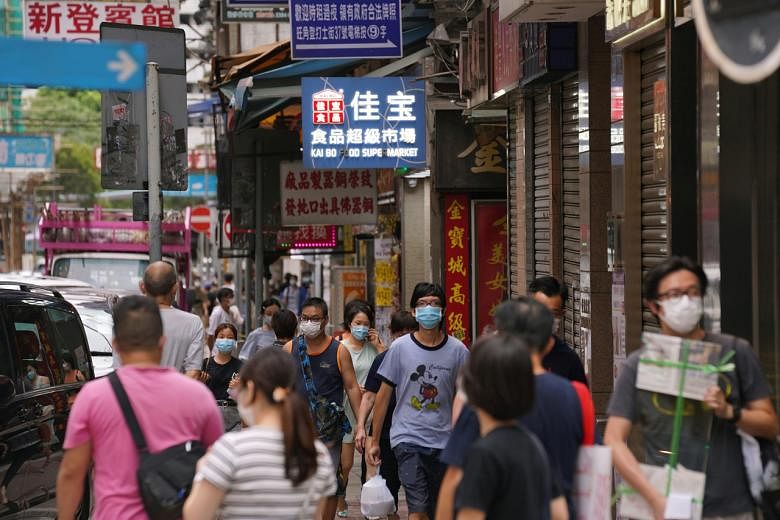HONG KONG - More than two months since the third wave of Covid-19 swept through the city, Hong Kong is moving to ease some restrictions and boosting the economy with a third stimulus package totalling HK$24 billion (S$4.21 billion).
Chief Executive Carrie Lam told a briefing on Tuesday (Sept 15) that the city had recorded no new community infections - the first time the daily number went down to zero since early July.
Health authorities confirmed four new imported cases, bringing the total number of confirmed cases to 4,975, including 101 deaths.
Secretary for Food and Health Sophia Chan announced at the briefing that from Friday, dining in services would be extended from the current 10pm to midnight for a week, with the cap on public gatherings to remain at four.
Businesses that were not reopened in previous rounds of easing such as pubs, bars, karaoke joints, party rooms, swimming pools, exhibition venues and the two theme parks - Disneyland and Ocean Park - will be allowed to have visitors again but subject to strict infection control requirements.
Ocean Park has said it will reopen on Friday but Hong Kong Disneyland has not set a date for it.
Separately, the authorities on Tuesday announced a third round of economic relief measures, including some HK$10 billion earmarked to procure vaccines, HK$4.5 billion to help 23 impacted industries such as tourism and the food and beverage sectors, as well as HK$6 billion on rent concessions.
The relief package is meant to support struggling businesses and will bring the total budget deficit to more than HK$300 billion, Financial Secretary Paul Chan said. He added that fiscal reserves will drop to about HK$800 billion or 12 to 13 months of government expenditure - close to what it was during the severe acute respiratory syndrome (Sars) pandemic in 2003.
Pledging to be prudent in helping enterprises and individuals, Mr Chan said: "At the same time we have to preserve our strength to prepare for the unknown. We have to preserve our fiscal strength to maintain confidence in our finances."
The government has already spent an unprecedented HK$287 billion or 10 per cent of the city's gross domestic product (GDP). This includes support through the anti-epidemic fund totalling some HK$150 billion, as well as various other relief measures that amounted to HK$120 billion.
As at end-August, the government has spent HK$78 billion to help 4.3 million people and 450,000 enterprises and companies.
More than 150,000 employers and 110,000 self-employed people sought help under the employment support scheme in the first tranche of support measures. In the second tranche, the government has received 158,000 applications from employers and 26,000 self-employed people.
In anticipation of a fourth wave of Covid-19 in the coming winter season, the government has decided to ramp up the public hospitals' general outpatient testing programme to over 40 clinics at the end of the month, up from 22 now. The number of daily test kits to be made available will also rise to 4,000 from the existing 2,400.
Testing of specific high-risk groups will continue to prevent clusters.
Officials said almost 1.8 million were tested for the virus and at least 42 were found to be positive at the end of a two-week voluntary free mass testing programme on Monday.
They added that the exercise cost the government HK$530 million, of which 70 per cent or HK$370 million were medical and support staff salaries.












